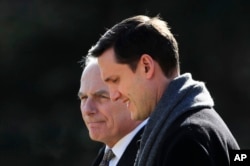The White House chief of staff revealed to reporters Friday that it was determined months ago there was no need for dozens of officials to have top secret clearances.
John Kelly said he made "immediate changes" after arriving as chief of staff when he noticed, in terms of the handling of classified material, the White House was not "up to the standards I was used to at the Department of Defense, administratively."
At that time, Kelly told reporters in his office Friday, when he realized the percentage of those still with interim clearance was "a lot," totaling "a couple of spreadsheets' worth of people," he asked the Federal Bureau of Investigation to speed up the process, especially for top officials.
Kelly also decided "not everyone needs a top secret clearance" and it was determined that "35, 40 or so people … realistically don't need the top secret and they can get by with a secret clearance and that was fine."
Amid the troubling pending cases, he said: "One young woman had excessive credit card debt. She was paying it down. She's since OK. And you all know that finances tend to be, more than anything else, why people violate security and, in some cases, turn into spies."
But one particular name, according to White House officials, did not jump out to Kelly or others at that time, which ended up becoming a debacle. That was the case of White House staff secretary Rob Porter.
Porter's departure
Kelly on Friday defended how Porter's ouster was handled early last month. Porter stepped down amid accusations by both his former wives that he had abused them.
Kelly, in a lengthy explanation about the process, noted that any questionable cases on determination of final top secret clearances are brought to White House counsel Don McGahn, "and then he would come to me and we would talk about it."
"In Rob Porter's case, we hadn't reached end game, which is when the security office reviews the package and makes its recommendation," Kelly said.
The chief of staff maintained that February 6 was the first time he heard about troubling allegations concerning Porter, who was a key aide to the president.
Kelly clarified that Porter resigned upon Kelly's learning of the first press inquiry about domestic abuse that day. Kelly said he then "made sure" of Porter's resignation about an hour later, when Kelly learned of the second press inquiry into abuse involving another ex-wife.
That assertion is "bunk," according to the Daily Mail's U.S. political editor, David Martosko, who said his publication did not bring the first ex-wife's claims to the attention of the White House until the following morning, February 7.
Reporters also pointed out to Kelly on Friday that the White House issued statements the night of February 6 defending Porter.
"The mix-up came the next day," according to Kelly, "when somebody said, 'Rob's still in the building.' My assumption was he was doing the checkout process."
Instead, Porter apparently was still going about his job and had not informed relevant staff he was no longer supposed to be working in the White House.
Kelly: No offer to quit
Kelly said he did not offer to resign over the episode, as has been reported: "I have absolutely nothing to even consider resigning over." But he acknowledged, "We didn't cover ourselves in glory in terms of how we handled that on Wednesday morning. It was confusing."
John Podesta, who served as President Bill Clinton's White House chief of staff, said on CNN on Friday that "way beyond they didn't 'cover themselves in glory,' they really let this problem fester." He alleged that the Trump administration was aware of the domestic abuse allegations well prior to the time they became publicized.
"Things are just unspooling there," asserted Podesta, who was campaign chairman for Democratic presidential nominee Hillary Clinton, who lost the 2016 election to Trump.
"There's no process left in the White House," Podesta said.
The U.S. Senate Select Committee on Intelligence is to hold an open hearing on security clearance reform next Wednesday.
"This hearing will address the complexities in the security clearance process for both government and industry alike and further inform the committee as it continues its oversight of the intelligence community," according to a statement from the committee.







